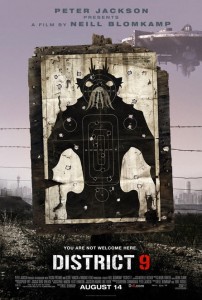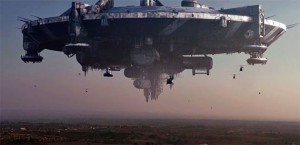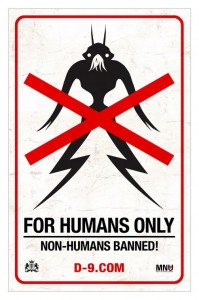 In connection with the long weekend I was finally able to see District 9, and with this post I’ll pass along some of my thoughts in relation to the film in light of a review by John T. Stanhope at Cinefantastique Online.
In connection with the long weekend I was finally able to see District 9, and with this post I’ll pass along some of my thoughts in relation to the film in light of a review by John T. Stanhope at Cinefantastique Online.
First, some of my initial thoughts. I have heard nothing but positive things about this film since before it was released and continuing after it hit theaters. The pre-release hype didn’t mean much for me since every studio tries to present its forthcoming film as almost the best movie ever made, but film reviewers that I trust sang the praises of District 9after it’s release which, coupled with the film’s storyline and social commentary made it a must see for me. In spite of the great reviewers’ accolades that I thought might raise unrealistic expectations, I enjoyed the film and am happy to echo the positive statements made by critics and reviewers.
Second, the film nearly literally made me sick. I admit to having a fast food burger shortly before going to the theater, and that no doubt played a part, but the grittyness of the film in depicting both the squalor of the living conditions for the stranded aliens in South Africa, the grotesque bodily changes in morphing from human to hybrid human-alien of the lead human character, and the graphic depiction of the greed, evil, and cruelty of human beings to both the aliens and other humans, all came together to create a sense of nausea in my cinema experience. Even so the film was enjoyable, a great contribution to the science fiction genre, with influences combining the elements of racism critique in the Alien Nation film and television series, and the bodily disintegration and metamorphosis from David Cronenberg’s The Fly.
Third, as might be expected for TheoFantastique with its emphasis on the exploration of social commentary through the fantastic in pop culture, I appreciated the ways in which the film touched on aspects of cultural critique, from the actions of the Multi-National United (MNU) as a thinly-veiled form of the United Nations, to the casual abortion of alien embryos, to the critique of Apartheid. Like much of science fiction in general, District 9 raises a number of issues related to “otherness” as well as cultural and social critique that make for interesting reflection.
 Beyond these initial thoughts I’d like to respond to some ideas shared by John Stanhope in his film review for Cinefantastique Online. After sharing in his opening paragraphs how repulsed he was by actions of the human beings in the film in their treatment of the aliens, a little later he expresses incredulity as to the conflict between intelligent aliens and humans:
Beyond these initial thoughts I’d like to respond to some ideas shared by John Stanhope in his film review for Cinefantastique Online. After sharing in his opening paragraphs how repulsed he was by actions of the human beings in the film in their treatment of the aliens, a little later he expresses incredulity as to the conflict between intelligent aliens and humans:
However, what I personally wound up questioning were the courses that the story and certain characters wound up taking. I had trouble with the logic of various actions pursued. I couldn’t see why the humans and (advanced) aliens couldn’t—or wouldn’t—attempt to work together more in order to try to solve some of everyone’s current dilemmas. Part of this was explained away as the aliens in question merely being worker bee types and not of huge scientific acumen. Yet, with what I saw some of the aliens doing, this didn’t fully gel with me.
A little later he expresses a related surprise as to the grotesqueness of the alien weapons in connection with alien intelligence:
By the way, we eventually get to see some of the alien weapons in action, but I couldn’t help asking myself why a race as advanced from us as these creatures obviously were would design such a messy, gory way of disposing of one’s enemy in the midst of close combat. I would think they’d come up with a way to disintegrate, rather than, well, splatter. It’s fun to watch and makes us go “eeeewww!” – but a practical for a highly advanced species?
 By way of my response, neither of these aspects of the film were surprising to me given human nature, the commentary of the film by way of humanity’s tendency toward violence, and the graphic way in which all of this was depicted in the film. Many times we make the mistake of assuming that higher intelligence is or should be equated with understanding and peace. But why should this be the case? How many times have we seen this view presented in science fiction, only to be dashed to pieces? Like the scientist in The Thing From Another World who thought the alien “vegetable” had to be intelligent enough to talk through a sensible solution, the assumption of intelligence and its connection to understanding, peace, and cooperation is depicted as an unrealistic assumption on the silver and small screens finding a parallel in the real world. The progress of humanity in intelligence and technology has not led to peace and cooperation, but rather, to a greater ability and tendency to wage war and inflict suffering. Since the human interactions with the aliens in District 9 serve in some sense as a metaphor and critique for Apartheid, I was not surprised by the lack of cooperation between scientific humans and intelligent aliens, or the graphic nature of the alien weapons and their destructive powers.
By way of my response, neither of these aspects of the film were surprising to me given human nature, the commentary of the film by way of humanity’s tendency toward violence, and the graphic way in which all of this was depicted in the film. Many times we make the mistake of assuming that higher intelligence is or should be equated with understanding and peace. But why should this be the case? How many times have we seen this view presented in science fiction, only to be dashed to pieces? Like the scientist in The Thing From Another World who thought the alien “vegetable” had to be intelligent enough to talk through a sensible solution, the assumption of intelligence and its connection to understanding, peace, and cooperation is depicted as an unrealistic assumption on the silver and small screens finding a parallel in the real world. The progress of humanity in intelligence and technology has not led to peace and cooperation, but rather, to a greater ability and tendency to wage war and inflict suffering. Since the human interactions with the aliens in District 9 serve in some sense as a metaphor and critique for Apartheid, I was not surprised by the lack of cooperation between scientific humans and intelligent aliens, or the graphic nature of the alien weapons and their destructive powers.
Related to this Stanhope takes issue with the medical “testing” done by human beings on aliens, and that which was intended upon the lead human character as MNU sought to take advantage of his hybrid DNA and its ability to activate alien weaponry. On this Stanhope writes:
The cruelty with which various tests were being perpetrated by humans disturbed me as well. Seeing no reason behind some of it is what troubled me. For instance, preparing to cut open an individualwhile he was fully awake and not even attempting to sedate him in any way, shape, or form made me think more of SAW than science fiction. Things like this and splatter guns seemed more fitting for exploitation than cerebral filmmaking, which is what I was hoping to see a little bit more of here.
Again, I wish I could share the author’s incredulity, since good science fiction in my view can be more cerebral even as it offers critique of “otherness,” but the cruelty of this segment of the film flowed from its overall narrative, and from what we know of human nature. Just last week I read a story about a common practice in the poultry meat processing industry wherein male chickens are thrown live into meat grinders since they don’t have the value that female chickens do. It would be simple to list any number of other acts of cruelty that human beings inflict on animals, and one doesn’t have to be an animal rights activist to be concerned with such acts. Beyond this, once human beings deny a sense of humanness or personhood to others then all kinds of atrocities become possible, from the Nazi experiments upon live human beings to the medical cruelty upon aliens in District 9. Surely some of the graphic medical tests depicted in this film are due to Western culture’s preferences toward cruelty and gore in horror films, but our tendency toward inhumanity toward our fellow creatures is a more likely source of cinematic influence, and one in keeping with the filmmakers’ cultural critique.
Overall I appreciate Stanhope’s thoughts in regards to District 9 and he provides a good review. I simply feel that his incredulity in regards to aspects of human behavior in the film shouldn’t be all that surprising if we’re honest about how we often behave toward one another, particularly those we label as significantly different if not inhuman. Science fiction, and films like District 9, help present us with narrative mirrors that make us uncomfortable, and rightly so. Thanks to Neill Blomkamp, Terri Hatchell, and Peter Jackson for making us squirm for all the right reasons.





Hello, Mr. Morehead. John Stanhope here. You are a thoughtful writer and I very much appreciate your kind approach to some of my review comments.
Believe me, I fully understand your position and had the actions in question been handled less sensationally I feel I could generally agree with you. However, I could easily sense the filmmakers ‘playing’ with their audience at times and this left me wanting a greater sense of authenticity. You even admitted to a degree of sensationalism yourself.
I do not consider myself ignorant of man’s inhumanity to man (or his fellow creatures), yet given that the Multi-National United (MNU) is essentially supposed to be the film’s version of the United Nations, one might expect to see a greater degree of attempts to mediate. Heck, the United Nations spends so much time trying to mediate that little of consequence manages to get done on many, many occasions.
I would expect the masses or smaller organizations to go off half cocked in a violent way at this point or that, but an organization that is created “assist” is a little different matter. And in the end, it’s less the inhumane views that trouble me than it is the manner in which such views are glorified on film and carried just wee bit further than one might expect or wish. Again, trying to literally rip into a poor “infected” man while he’s wide awake, thrashing and screaming? If nothing else, it’s a very impractical–and unscientific–way of conducting a scientific study of what is occurring to him.
As for the aliens’ attitude toward humans – in the case of the wonderful film THE THING, the people in it have to come to terms with the apparent fact that this advanced life form sees as us having no more significance to it (or the universe) than we think a, well, chicken might have with us. But we do not at all get this sense within DISTRICT 9. It is a different relationship entirely. Indeed, man even started out as the savior of the alien race, in a manner of speaking.
The weapon issue was simply one of pragmatics for me. The completeness of its destructive power isn’t what bothered me; it was just that it seems such an impractical and very messy way for such advanced beings to dispatch an enemy. The film’s approach struck me as showy and cinematic, a way to give people a thrill (though it was kind of fun to watch). And it certainly worked; every time those guns were used the audience squealed with joy (it was not unlike the emotions expressed during a rollercoaster ride).
I apologize if I’m getting too wordy here. I’ll leave things there, accept to say that I do agree with you in terms of the film being a significant entry into the Sci-Fi genre. I did like it and it does make interesting commentary, yet I still believe it plays its hand a little too heavily at times. Peter Jackson has done so in the past (though I very much respect him) and this product showed some similar traits to that which he has done.
Thank you again for taking the time to read my piece, and for your thoughtful and reasoned comments on some of my own thoughts.
Best wishes,
John
John, please call me John. Thank you for sharing your responses to my thoughts on your nice review of District 9. I appreciate thoughtful commentary and yours is surely an example of this.
I’ve now seen the film, and will be writing my own comments on my blog, but just one point I think needs noting. MNU is not the United Nstions or anything like it. To translate it in to a North American context, think of Halliburton, Blackwater and Monsanto all rolled into one. It purpose is very remote from mediation. Its purpose is profit.
Thanks for your commentary on the film on your own blog, Steve, and for your thoughts on interpreting MNU. I’m always open to correction, but in light of your comments I’d argue that my interpretation was only partially correct and that MNU is best understood as a combination of the entities you mention as well as the United Nations. While the UN is ostensibly about mediation and non-profit, it has a history of making many associated with it profitable, and it appears to be about more than mediation. Perhaps the screenplay writers and director intend critique of multiple entities.
I think I must re-read The constant gardener, and see what role the United Nations plays in that.